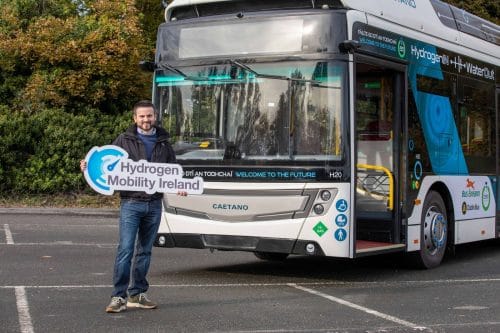Through Hydrogen Mobility Ireland (HMI), the first ever Hydrogen Fuel Cell Electric Vehicle (FCEV) is about to be put into public service operation on the island of Ireland.
The zero emissions Caetano ‘H2.CityGold’ fuel cell electric pre-production bus will operate a multi-week, in-service trial in the Dublin area. This bus, powered by a 60KW Toyota fuel cell stack.
It is particularly significant that the vehicle in this first trial, in conjunction with the Department of Transport, is a Bus that will be operated on different routes by CIÉ Group bus companies Bus Éireann and Dublin Bus as well as by Dublin City University (DCU) and Dublin Airport over a number of weeks in November and December, albeit carrying limited passengers due to the current Covid restrictions.
This is a cutting-edge technology that promises to make a huge contribution to the Climate challenge in Ireland, specifically in the Transport Sector. The emission free Caetano ‘H2.CityGold’ bus will run on green hydrogen (H2) produced in Dublin by BOC Gases Ireland Ltd using renewable electricity and water. The fuel cell electric bus is refuelled in minutes, similar to a conventional bus and its electric motive power is obtained when the Hydrogen molecules from its fuel are combined with Oxygen molecules from the air in the Fuel Cell. As part of HMI’s roadmap for hydrogen deployment, this collaborative trial will extend from early November to mid-December giving real in-use information on the practical operation of the technology in varying weather, usage, and traffic conditions. HMI member ESB, will provide the green electricity used to produce the Hydrogen fuel for the trial. The only output from the vehicle is water.
Speaking at the launch of the Hydrogen Fuel Cell Bus on the road, HMI Chairman Mark Teevan (Toyota Ireland) said: “this should be viewed as an important event, not because it’s the first H2 bus on the road; but because it is a first step into the future for Ireland, enabling us to begin to envisage the practical solutions that will allow us to fully decarbonise road transport. We are all very conscious of the Environmental challenge we face in meeting our 2030 targets and the need to find zero-emissions solutions that will satisfy the varying needs of different users; public transport, haulage, van delivery, taxi or private car. FCEV’s are Electric Vehicles, providing specific benefits that include very quick refuelling, long range, and a particular suitability for heavy and long-distance requirements. We are delighted that Dublin has been selected to host the very first trial of the Caetano RHD prototype fuel cell bus. “
CaetanoBus, part of the Salvador Caetano Group and Mitsui & Co, is the most important manufacturer of buses and coaches in Portugal. In 2019, the Company presented its latest development, the H2.City Gold – the new hydrogen-powered Caetano electric bus. In the beginning of this year Caetano started its commercialisation phase and, in the 2nd, quarter-initiated fuel cell bus production plans. This is an innovative project that reflects the economic and environmental benefits of hydrogen towards a decarbonised society.
The trial will allow the partners to test this technology in everyday driving conditions and at a challenging time of the year in terms of weather, thereby gaining valuable information about the potential for large scale introduction of this technology in Ireland. DCU/CIE also intend to obtain insights and feedback from passengers on the bus. Today’s hugely significant step will be followed early next year by a National Transport Authority trial involving a number of Double Decker FCEV buses while in Northern Ireland HMI Member Energia will shortly commence the production of H2 for road transport at a Wind Farm in County Antrim which will be used as fuel for FCEV buses in Belfast. The increasing rate of developments is a visible confirmation that hydrogen for road transport is beginning to move into the delivery phase.
The Hydrogen Mobility Ireland project is a partnership of businesses from across many sectors, together with public sector and academic stakeholders, with all-Island cooperation, joining together to deliver a coordinated approach to the introduction of this cutting-edge technology to ensure that Ireland can benefit from being an early starter in this environmental transport solution. In addition to its use in transport, it is anticipated that Hydrogen will have a significant role to play in the decarbonisation of many other sectors of the economy.



